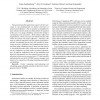Free Online Productivity Tools
i2Speak
i2Symbol
i2OCR
iTex2Img
iWeb2Print
iWeb2Shot
i2Type
iPdf2Split
iPdf2Merge
i2Bopomofo
i2Arabic
i2Style
i2Image
i2PDF
iLatex2Rtf
Sci2ools
110
click to vote
IPPS
2003
IEEE
2003
IEEE
Flexible CoScheduling: Mitigating Load Imbalance and Improving Utilization of Heterogeneous Resources
Fine-grained parallel applications require all their processes to run simultaneously on distinct processors to achieve good efficiency. This is typically accomplished by space slicing, wherein nodes are dedicated for the duration of the run, or by gang scheduling, wherein time slicing is coordinated across processors. Both schemes suffer from fragmentation, where processors are left idle because jobs cannot be packed with perfect efficiency. Obviously, this leads to reduced utilization and sub-optimal performance. Flexible coscheduling (FCS) solves this problem by monitoring each job’s granularity and communication activity, and using gang scheduling only for those jobs that require it. Processes from other jobs, which can be scheduled without any constraints, are used as filler to reduce fragmentation. In addition, inefficiencies due to load imbalance and hardware heterogeneity are also reduced because the classification is done on a per-process basis. FCS has been fully imple...
Distinct Processors | Distributed And Parallel Computing | Fine-grained Parallel Applications | Gang Scheduling | IPPS 2003 |
| Added | 04 Jul 2010 |
| Updated | 04 Jul 2010 |
| Type | Conference |
| Year | 2003 |
| Where | IPPS |
| Authors | Eitan Frachtenberg, Dror G. Feitelson, Fabrizio Petrini, Juan Fernández |
Comments (0)

